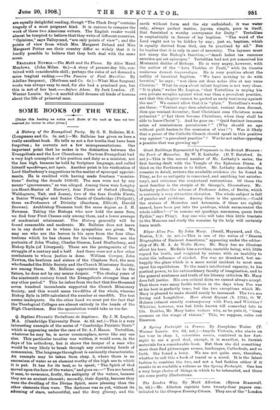SOME BOOKS OF THE WEEK.
(Under this heading we notice such Books of the week as have not been reserved for review in other forms.] A History of the Evangelical Party. By G. R. Balleine, M.A. (Longman and Co. 5s. net.)—Mr. Balleine has given us here a really excellent book. He tells us not a few truths that have been forgotten ; he corrects not a few misrepresentations. One important point that he makes is the distinction between the Evangelicals and the Low Churchmen. The true Evangelical had a very high conception of his position and duty as a minister, not the less high because be held by Scripture language, and called himself irparilierepor, not !veils. Another point is his vindication of Lord Shaftesbury's suggestions in the matter of episcopal appoint- ments. He is credited with having made fourteen "nomina- tions" during the decade 1856-65. The men were not by any means" ignoramuses," as was alleged. Among them were Longley (ex-Head-Master of Harrow), four Firsts of Oxford (Baring, Waldegrave, Tait, and Jeune), two of the four Double Firsts, a Senior Wrangler and Senior Classic of Cambridge (Philpott), three ex-Professors of Divinity (Jacobson, Ellicott, Harold Browne). Archbishop Thomson took the same degree as J. H. Newman. Taking the Bishops who now hold the same Sees, we find four First Classes only among them, and a lower average of academical attainment. The History generally will be found reasonable and moderate. Mr. Balleine does not leave us in any doubt as to where his sympathies are given. We may see who are the heroes in his eyes from the four illus- trations which be has chosen for his volume. These are the portraits of John Wesley, Charles Simeon, Lord Shaftesbury, and Bishop Ryle (of Liverpool). These are the protagonists of the struggle of a century and a half. And there were not a few other combatants to whom justice is done. William Cowper, John Newton, the brethren and sisters of the Clapham Sect, the men who founded the Bible Society and the Church Missionary Society, are among them. Mr. Balleine appreciates them. As to the future, he does not by any means despair. "The closing years of the nineteenth century found the Evangelicals stronger than at any other period." This he infers from the fact that five thousand seven hundred incumbents supported the Church Missionary Society, and this would mean two-fifths of the whole, whereas Bishop Ryle in 1870 calculated the number at one-fifth. The test seems inadequate. On the other hand we must put the fact that the Theological Colleges are almost entirely in the hands of the High Churchmen. But the speculation would take us too far.










































 Previous page
Previous page